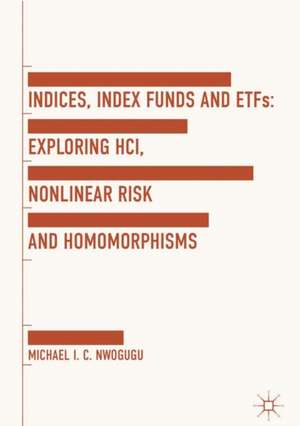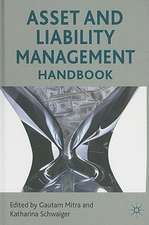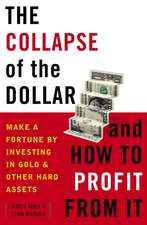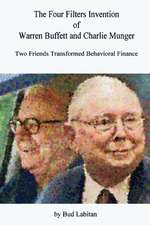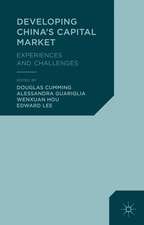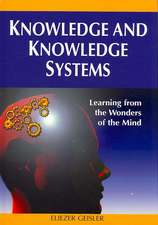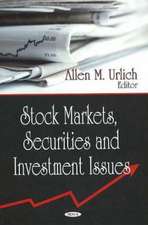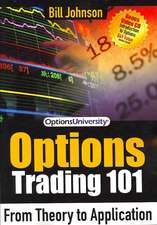Indices, Index Funds And ETFs: Exploring HCI, Nonlinear Risk and Homomorphisms
Autor Michael I. C. Nwoguguen Limba Engleză Hardback – 21 mar 2019
Preț: 631.55 lei
Preț vechi: 694.02 lei
-9% Nou
Puncte Express: 947
Preț estimativ în valută:
120.86€ • 125.72$ • 99.78£
120.86€ • 125.72$ • 99.78£
Carte disponibilă
Livrare economică 24 martie-07 aprilie
Livrare express 07-13 martie pentru 49.82 lei
Preluare comenzi: 021 569.72.76
Specificații
ISBN-13: 9781137447005
ISBN-10: 1137447001
Pagini: 504
Ilustrații: XXII, 696 p. 21 illus.
Dimensiuni: 148 x 210 x 46 mm
Greutate: 1 kg
Ediția:1st ed. 2018
Editura: Palgrave Macmillan UK
Colecția Palgrave Macmillan
Locul publicării:London, United Kingdom
ISBN-10: 1137447001
Pagini: 504
Ilustrații: XXII, 696 p. 21 illus.
Dimensiuni: 148 x 210 x 46 mm
Greutate: 1 kg
Ediția:1st ed. 2018
Editura: Palgrave Macmillan UK
Colecția Palgrave Macmillan
Locul publicării:London, United Kingdom
Cuprins
1. Introduction.- 2. Number Theory, “Structural Biases” and Homomorphisms in Traditional Stock/Bond/Commodity Index Calculation Methods in Incomplete Markets with Partially Observable Un-aggregated Preferences, MN-Transferable-Utilities and Regret–Minimization Regimes.- 3. A Critique of Credit Default Swaps (CDS) Indices.- 4. Invariants and Homomorphisms Implicit in, and the Invalidity of the Mean-Variance Framework and Other Causality Approaches: Some Structural Effects.- 5. Decision-Making, Sub-additive Recursive “Matching” Noise and Biases in Risk-Weighted Stock/Bond Commodity Index Calculation Methods in Incomplete Markets with Partially Observable Multi-attribute Preferences.- 6. Informationless Trading and Biases in Performance Measurement: Inefficiency of the Sharpe Ratio, Treynor Ratio, Jensen’s Alpha, the Information Ratio and DEA-Based Performance Measures and Related Measures.- 7. Anomalies in Taylor-Series, and Tracking Errors and Homomorphisms in the Returns of Leveraged/Inverse ETFs and Synthetic ETFs/Funds.- 8. Human Computer Interaction, Misrepresentation and Evolutionary Homomorphisms in the VIX and Options-Based Indices in Incomplete Markets with Unaggregated Preferences and NT-Utilities Under a Regret Minimization Regime.- 9. Human–Computer Interaction, Incentive-Conflicts and Methods for Eliminating Index Arbitrage, Index-Related Mutual Fund Arbitrage and ETF Arbitrage.- 10. Some New Index-Calculation Methods and Their Mathematical Properties.- 11. Financial Indices,Joint Ventures and Strategic Alliances Invalidate Cumulative Prospect Theory, Third-Generation Prospect Theory, Related Approaches and Intertemporal Asset Pricing Theory: HCI and Three New Decision Models.- 12. Economic Policy, Complex Adaptive Systems, Human-Computer-Interaction and Managerial Psychology: Popular-Index Ecosystems.- 13. Implications for Decision Theory, Enforcement, Financial Stability and Systemic Risk.
Notă biografică
Michael I. C. Nwogugu is an author, entrepreneur, and consultant who has held senior management and Board-of-Director positions in companies in both the U.S. and Nigeria. Mr. Nwogugu has written three books: Risk in the Global Real Estate Market (Wiley); Illegal File-sharing Networks, Digital Goods Pricing and Decision Analysis (CRC Press); and Anomalies In Net Present Value, Returns And Polynomials And Regret Theory In Decision Making (Palgrave MacMillan). Mr. Nwogugu’s research articles have been cited in top academic journals such as International Journal of Approximate Reasoning; Applied Mathematics & Computation; Journal of Business Research; European Journal of Operational Research; PNAS; Annual Review of Psychology; Neural Computing & Applications; Mathematical Methods of Operations Research; Computers & Industrial Engineering; and Expert Systems With Applications among others. Mr. Nwogugu earned degrees from the University of Nigeria; CUNY, New York, USA; and Columbia University, New York, USA.
Textul de pe ultima copertă
Indices, index funds and ETFs are grossly inaccurate and inefficient and affect more than €120 trillion worth of securities, debts and commodities worldwide. This book analyzes the mathematical/statistical biases, misrepresentations, recursiveness, nonlinear risk and homomorphisms inherent in equity, debt, risk-adjusted, options-based, CDS and commodity indices – and by extension, associated index funds and ETFs. The book characterizes the “Popular-Index Ecosystems,” a phenomenon that provides artificial price-support for financial instruments, and can cause systemic risk, financial instability, earnings management and inflation. The book explains why indices and strategic alliances invalidate Third-Generation Prospect Theory (PT3), related approaches and most theories of Intertemporal Asset Pricing. This book introduces three new decision models, and some new types of indices that are more efficient than existing stock/bond indices. The book explains why the Mean-Variance framework, the Put-Call Parity theorem, ICAPM/CAPM, the Sharpe Ratio, Treynor Ratio, Jensen’s Alpha, the Information Ratio, and DEA-Based Performance Measures are wrong. Leveraged/inverse ETFs and synthetic ETFs are misleading and inaccurate and non-legislative methods that reduce index arbitrage and ETF arbitrage are introduced.
Caracteristici
Analyses nonlinear risk, human biases and computational biases inherent in indices, ETFs and Index Funds. Discusses the complex adaptive systems approach and the “ecosystem of the index world”; and implications of indices, ETFs and index funds for asset pricing and Cumulative Prospect Theory. Critiques the introduction of new index models and ETFs models, and methods or preventing or reducing index-arbitrage and ETF arbitrage.
